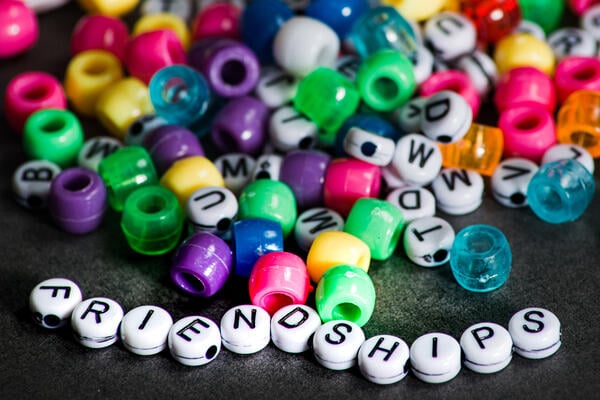How important is friendship to you? According to a Pew Research Center study in 2023, 61 percent of U.S. adults said having close friends is extremely or very important for people to live a fulfilling life, which is much higher than the share who said the same about being married (23 percent), having children (26 percent) or having a lot of money (24 percent). Meanwhile, almost one in three Americans feel lonely every week.
In this context, perceptions of workplace friendships are evolving as the world of work transforms. Working professionals consider having a best friend at work to be even more important since the start of the pandemic and the dramatic increase in remote and hybrid work. Younger generations, such as millennials and Gen Zers, want to curate authenticity and set boundaries. They may prioritize job satisfaction and mental health over other traditional factors. How do those new priorities relate to friendship?
In addition to well-being benefits, having friends at work can contribute to an individual’s professional development and workplace performance. Working in an environment that fosters vulnerability, as friendships often do, enables individuals to challenge themselves in ways they may otherwise avoid.
The topic of friendship at work often focuses on the postgraduate workforce. We argue for the importance of applying the same principles to the graduate student and postdoctoral experience. We discuss ways in which graduate students and postdoctoral scholars can benefit from prioritizing friendships and essential interpersonal skills, which can lead to a more robust academic experience and support network.
Navigating Challenges and Life After Graduate School
Studies show that strong relationships at work are linked to a lower risk of burnout, better mental health and fewer traumatic experiences. Having peer friendships helps graduate students and postdoctoral scholars cope with the rigorous nature of their academic training. Although the demands of this training can make it difficult to prioritize one’s social life, intense work environments in group settings also provide many opportunities for like-minded individuals to get to know each other beyond the immediate tasks at hand.
Cultivating such relationships helps students and scholars to navigate the challenges of graduate school and/or their postdoctoral training and work with the benefit of a support system. Sometimes people struggle to comprehend the unique and specific nature of graduate training. Having peers in the same environment allows one to work through challenges and problems with someone who knows firsthand the context of what they are experiencing.
As graduate students and postdoctoral scholars face points of transition, either at the beginning or end of their training, many will leave their current support network and find themselves in need of building new connections. Yet, fulfilling friendships can take time and effort to build. Friendships formed in graduate school can provide an incredible form of support for any moment in life and can have lifelong implications for personal and professional careers. In fact, many of us in the workplace still talk to friends we made during our graduate school years and cherish the memories we built based on understanding and trust.
Strengthening Academic Research and Performance
A significant portion of the research on workplace friendships highlights the increase in performance and productivity that results from the presence of such relationships. Happiness leads to increased performance across the board. Developing friendships among peers can result in an increase in potential collaborators for opportunities such as co-authorships, conference presentations or interdisciplinary research. It can also happen the other way around—connections that begin as professional collaborations may turn into friendships.
The two of us writing this article are real examples of how developing friendships within the workplace can provide benefits to one’s career growth. We met as colleagues and quickly found commonalities in our personal interests and professional goals. While our jobs took us to different institutions, a robust co-writing dynamic emerged from the foundations of our friendship. Our story is similar to that of many scholars who write with their friends.
Developing Transferable Skills
Creating meaningful connections also helps graduate students and postdoctoral scholars strengthen key transferable skills that are relevant in preparing for diverse career paths. Consider three that come to mind:
- Communication: For many friendships, there is a sense of comfort that develops over time. This bond encourages an ease in conversations lacking in other types of interactions. Friends can be a sounding board when you are attempting to process your thoughts and put them into words for an external audience.
- Collaboration: Some graduate students and postdoctoral scholars may conduct solitary research with little opportunity to work within a team or group setting, especially in the humanities. Identifying opportunities to collaborate with friends helps to develop the ability to contextualize one’s responsibilities within a broader project. This cultivates a skill that employers often prioritize in the hiring process: collaboration or teamwork.
- Cultural competency: Another benefit to fostering workplace friendships is becoming more aware of different lived experiences from your own. While it is possible to do this through less personal interactions, friendships allow you to share life stories and perspectives and build deeper connections. Expanding your perspective will allow you to become a stronger scholar (during your time in graduate school or postdoctoral training) and professional (whatever your postgraduation plans may be) in an increasingly diverse world.
Implications for Career Development
Of course, there are some challenges to keep in mind with workplace friendships. These may include: trusting someone too soon and oversharing, participating in gossip and rumors, and in-group pressure to fit in, which ultimately leads to exclusion of some through group homogeneity and barriers to opportunities. Other challenges exist for individuals with marginalized backgrounds. The lack of diversity or representation in certain disciplines can further feelings of isolation and take a greater toll on one’s well-being.
Those of us working with this unique population can make an intentional effort to facilitate meaningful relationship-building and address the challenges above through educational programming. Professional development events for marginalized populations often provide a “third space” for individuals to connect in a critical mass, breathe and celebrate, and identify role models and peer collaborators. The University of Maryland system’s Alliance for Graduate Education and the Professoriate is a great example of community-building.
Another viable option for educators and institutions to consider is to leverage the power of peer or near-peer mentoring. Research highlights the importance of mentoring constellations, which acknowledge the varying needs of a mentee and how mentoring relationships differ in structure or intensity. While a “vertical mentor” may be more senior in an organization and offer guidance to mentees based on career progression or life stages, a “horizontal mentor” refers to a peer at a similar career level who shares the mentee’s experiences and challenges. At the University of Maryland, College Park, the Graduate School has created a near-peer mentoring program that focuses on interdisciplinary knowledge-sharing between a doctoral student and a postdoctoral scholar over a year. This program promotes a culture of mentoring where both parties can develop self-awareness and build skills critical to their respective careers.
Finally, how can graduate students and postdoctoral scholars go about making friends at work? Begin by prioritizing relationships in the spaces you occupy, especially during moments of uncertainty. Then, attend and leverage university programming around well-being, professional development and mentoring, to meet people with similar interests and values. Next, look carefully within your high-touch professional relationships, and consider how proximity, similarity, and reciprocity can help you facilitate the initiation and development of a friendship.
Yi Hao is the program director of career and professional development at the Graduate School of the University of Maryland, College Park, and a member of the Graduate Career Consortium—an organization providing an international voice for graduate-level career and professional development leaders.
Mallory Neil is the director of industry partnerships for the College of Science at Clemson University.








